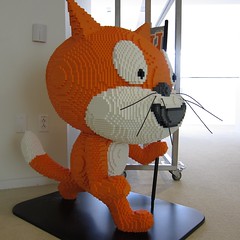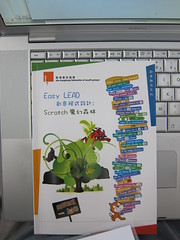 I have been looking forward to this Scratch conference. Last one was two years ago and it was a great event. This year it is held at the almost brand new Media Lab building. I had been there for various local events before in the evenings, but this is the first time I get to spend the day there, and we get to check out the view from the terrace. What a beautiful 90 million dollars building.
Adapting Workshops for Informal Library Settings
There are always too many good sessions and not enough time. I decided to skip most of the demo and workshop type of sessions and went for the big ideas. With my current involvement with schools and libraries, the first session I went to was a session by Jennifer Nelson of the Hennepin County Library and Keith Braafladt of the Science Museum of Minnesota. They Talked about their experience in adapting Scratch workshops from the paid Museum classes settings to free workshops in the library settings.
I have been looking forward to this Scratch conference. Last one was two years ago and it was a great event. This year it is held at the almost brand new Media Lab building. I had been there for various local events before in the evenings, but this is the first time I get to spend the day there, and we get to check out the view from the terrace. What a beautiful 90 million dollars building.
Adapting Workshops for Informal Library Settings
There are always too many good sessions and not enough time. I decided to skip most of the demo and workshop type of sessions and went for the big ideas. With my current involvement with schools and libraries, the first session I went to was a session by Jennifer Nelson of the Hennepin County Library and Keith Braafladt of the Science Museum of Minnesota. They Talked about their experience in adapting Scratch workshops from the paid Museum classes settings to free workshops in the library settings.
Some highlights:
- it is difficult to gain focus of the teenagers at the information settings, often they are distracted by having to baby sitting a younger sibling at the same time, for example
- as a free workshop, best goal is to introduce enough concepts so that it will extend their interest, or give them enough knowledge so that they will try it themselves later
- personalize the experience to spark the interest / gain their attention
- music is big with teenagers, not video games -- start with project that use their own music
- "all about me" project is a good example (didn't we do this at Kindergarten?) -- personalized story telling
- this session also reinforce for me the importance of community library, especially at an urban settings like ours
- BTW they have a book coming out, and this is their new public website containing useful resources
Computational Thinking
Why do I attend these conference? To learn outside of my usual circles. This is what I consider Computational Thinking to be the next New Big Idea. The educators and the computer scientists are still debating what exactly is Computational Thinking. Yasmin Kafai, Mitchel Resnick, Karen Brennan and Barbara Ericson described the many aspect of this new idea. You can also read the initial paper by Jeannette Wing to get some background. I am going to let you read all the current articles and decide exactly what is Computational Thinking. At a computer scientist and an amateur educator I think this new direction is going to be big. The Workshop Report is available, and you can download a free copy there.
LEAD Creative Classes in Hong Kong
It is always good to hear what's going on in Hong Kong, especially about education. Who knows, we may head back there some day! Dr. Felicia Tsang gave a wonderful review of their efforts in integrating Scratch and other creative classes into the core curriculum in Hong Kong's local primary and secondary schools. Some of her observations:
- Don't make mistake of running workshop for the teachers, get them involved at the beginning
- being so test driven, these classes stop after Form 3, because they are then focused (sadly) on the public exams
- Parents thought negatively on why the teachers are doing "unusual" things with the kids instead of teaching them the old way (just like what the parents went thru in the old days)
- While HK Government fully back the ideas and funding and equipment is not a problem, often schools ended up locking up computers because they don't know what to do with them
- parents (and sometimes teachers) are intimidated because the children will ended up knowing more then what the adults know
- the traditional Chinese localization is not good, the blocks are translated literally, and often do not make sense. They ended up using the English interface once they learnt the system
- Scratch is introduced through non technology classes, starts with art and English classes.
- Starts with all girl schools, then challenge the boy schools with the impressive results
 Dr Tsang showed off an amazing robot that some student built, taking a year, from parts sourced from street vendors from the electronics district. (The old Aplui street? I spent many weekends there during my school days).
Dr Tsang showed off an amazing robot that some student built, taking a year, from parts sourced from street vendors from the electronics district. (The old Aplui street? I spent many weekends there during my school days).